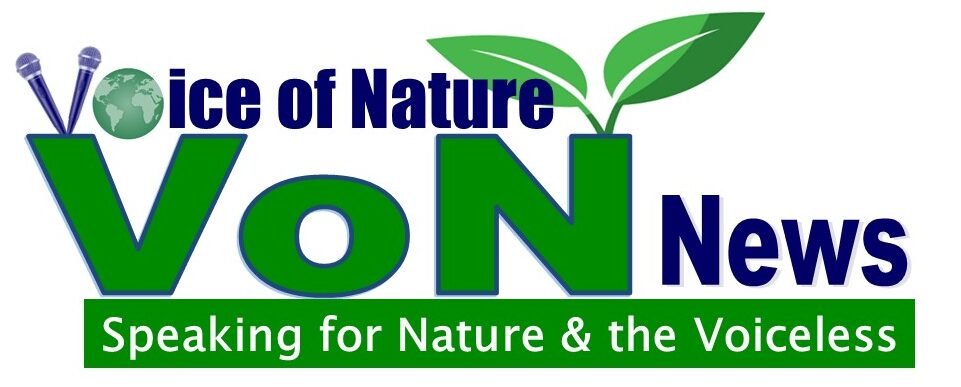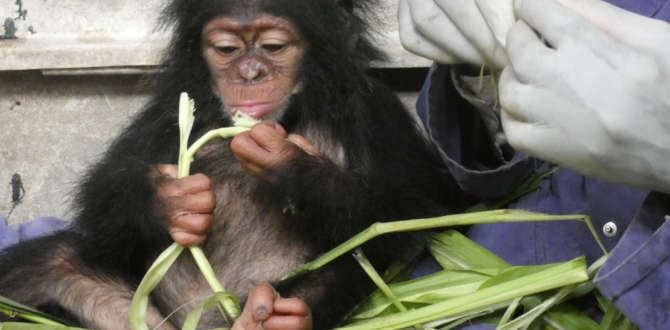By Shuimo Trust Dohyee in Buea
_____________________________
Wildlife in Cameroon is at the mercy of poachers but a wildlife sanctuary is helping to take care of rescued wildlife.
When Bakossi was brought to the Limbe Wildlife Center in April 2022, she was visibly traumatized, merely walking and the possibility of it surviving looked very slim. Bakossi, an orphaned Nigeria-Cameroon chimpanzee, is a victim of the cruel illegal bushmeat and pet trade in Cameroon. Illegal activities in protected areas and biodiversity hotspots are rife, and Bakossi will have to grow up without her family because of it. She likely saw her mother and family murdered before her eyes so that their meat could be sold. She was then taken to be sold into the lucrative pet trade.
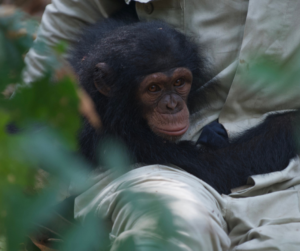
April 2023 marked one year since the arrival of Bakossi at the Limbe Wildlife Centre (LWC) in Cameroon’s Southwest Region. The young chimpanzee was confiscated by wildlife officials from Cameroon’s Ministry of Forestry and Wildlife (MINFOF) after they heard that she was being held by a farmer in the Bakossi National Park, the Park the young chimpanzee is named after.
“I saw Bakossi arrive at the LWC feeble and hardly able to grasp on her own”, says Dr. John Kiyang, a veterinarian at the LWC. “The chimpanzee” he continues “was estimated to only be one year old on arrival, and surely traumatized having experienced her family being killed for bushmeat’.
The Nigeria-Cameroon chimpanzee (Pan troglodytes ellioti) is the most threatened subspecies of chimpanzee as it has the smallest geographic range and smallest population. It is estimated that there are at most 9,000 individuals left in the wild, and perhaps as few as 6,000.
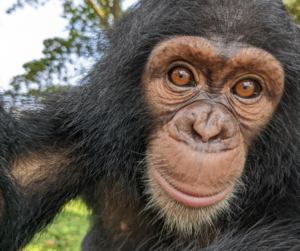
Kiyang remarks that “With such a dwindling population, it is more important than ever to focus conservation efforts on protecting this fascinating chimpanzee subspecies which should be regarded as a proud symbol of the Cross-Sanaga Region”.
It occurs only in Cameroon, west of the Sanaga River, and far Estern Nigeria, and is particularly threatened by landscape fragmentation, habitat loss from deforestation, diseases, commercial bushmeat hunting, and human-wildlife conflict. Sadly, Bakossi will not grow up in the forest with her troops as she should. Nigeria-Cameroon chimpanzees live in social family groups, typically composed of 4 to 12 individuals, and it is estimated that up to 10 chimpanzees must be killed for a hunter to take possession of a baby like Bakossi.
“For the past year Bakossi has been carefully taken care of by our expert animal carers and veterinary staff and is growing into a young and confident little chimpanzee”, says Laura Praill, Fundraising and Communication Manager at the LWC.
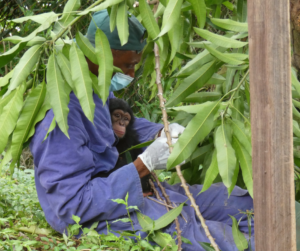
Chimpanzees do not make good pets, as they are wild animals that eventually grow into strong adults that can easily overpower and injure humans. “She quickly navigated the growth curve and today can be seen as a strong developing juvenile that would run around, climbing short trees and enjoy playing with her carer”, Kiyang says.
Chimpanzees like Bakossi, with other species, play an essential role in maintaining the ecological balance of Cameroon’s unique and biodiverse forests. They consume many varieties of fruits and replenish the forest by dispersing the seeds throughout their habitat via their feces.
While multiple organizations are also focused on reducing conflict between chimpanzees and humans and promoting peaceful coexistence, Laura says the LWC has developed and is implementing a project known as Green Project aimed at reducing poaching in Mount Cameroon National Park by providing sustainable alternative livelihoods for a former hunting community (which also provide green leafy products for the LWC chimpanzees to eat). Mount Cameroon is one of the chimpanzee strongholds in Cameroon.
Other organizations like the Wildlife Conservation Society (WCS) employ multiple methods to protect chimpanzees and their habitat in Cameroon and Nigeria. It should be noted that the LWC is a wildlife sanctuary which is possible thanks to a partnership between MINFOF and Pandrillus Cameroon.
